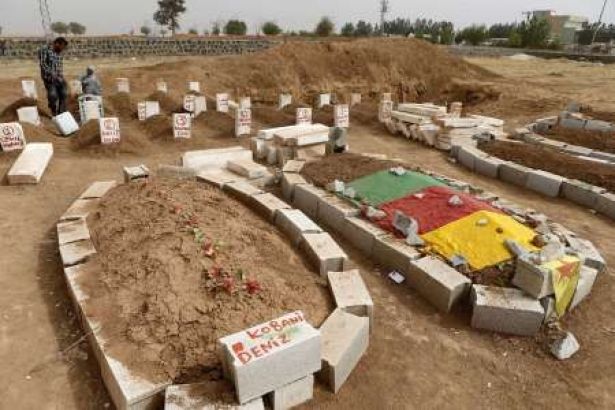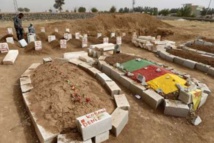At least 120 civilians were killed in a 24-hour rampage on Kobane, and another 26 were executed in a nearby village, the Syrian Observatory for Human Rights said.
The bullet-riddled bodies of 18 people -- including children -- were found Friday in the streets of Kobane, the Britain-based Observatory said, adding that they had been shot "at close range".
"The body of one child bore the impact of five bullets," it said.
The assault -- in which 42 IS fighters and 10 Kurds also died -- began on Thursday when three IS suicide bombers blew up vehicles at the entrances to Kobane, a symbol of Kurdish resistance.
Women were among civilians whose bodies were found in homes and on the streets, the Observatory said.
"According to medical sources and Kobane residents, 120 civilians were executed by IS in their homes or killed by the group's rockets or snipers," Observatory director Rami Abdel Rahman told AFP.
"When they entered the town, the jihadists took up positions in buildings at the southeast and southwest entrances, firing at everything that moved."
Kurdish journalist Mostafa Ali said there was no military dimension to the assault.
- 'Human shields' -
"IS doesn't want to take over the town. They just came to kill the highest number of civilians in the ugliest ways possible," he told AFP.
Kurdish activist Arin Shekhmos said: "Every family in Kobane lost a family member on Thursday."
The jihadists entered Kobane at dawn Thursday disguised as Kurdish People's Protection Units (YPG) fighters, Ali said.
They took up positions in buildings in the south of the town, using civilians as "human shields".
"There are at least 70 civilians in these various neighbourhoods that have been taken hostage by IS," Ali added.
"The YPG has sent reinforcements and have encircled the buildings, but the situation is difficult. The YPG doesn't want to hurt the women and children there."
More than 1,000 fleeing civilians waited on the Syrian side of the frontier with Turkey on Friday, carefully watched by Turkish troops and police.
Relatives who had made it across the border cried in despair, an AFP photographer reported.
Kobane was the scene of one of IS's most dramatic defeats when Kurdish militia backed by US-led air strikes ousted the jihadists in January after four months of heavy fighting.
Kurdish fighters have gone on to seize Tal Abyad, another border town farther east, in a blow to the jihadists' supply lines.
IS has hit back against Kurdish victories with an offensive against Hasakeh in the northeast, capital of the mainly Kurdish province of the same name.
- Suicide bombing -
Abdel Rahman said IS had seized two neighbourhoods in the city's south as government forces, who jointly controlled the city with Kurdish militia, launched air strikes.
At least 20 jihadists and 30 pro-government fighters were killed when IS captured southern parts of Hasakeh.
An IS suicide bomber also killed at least 20 regime troops on Friday, when he targeted the criminal security headquarters in the city's south, the Observatory said.
Pictures posted online by IS show what appear to be the bodies of soldiers as well as weapons and ammunition they claimed to have seized.
On Thursday, the UN Office for the Coordination of Humanitarian Affairs (OCHA) said the Hasakeh clashes had displaced an estimated 60,000 people, including 10,000 who fled north towards Amuda.
Shekhmos said civilians from southern neighbourhoods had fled to Kurdish-controlled parts of the city, but that the YPG was not yet involved in the fighting.
The jihadists previously advanced to the southern edge of Hasakeh in May but were pushed back by government forces.
Information Minister Omran Zohbi urged "anyone who is capable of carrying a gun" to "protect Hasakeh", official SANA news agency reported Friday.
In southern Syria, a rebel alliance has been pressing an assault since Thursday on the city and provincial capital of Daraa that has killed 70 people, 40 of them rebels, said the Observatory.
President Bashar al-Assad's regime has already lost two provincial capitals in the four-year-old civil war: IS-held Raqa in the Euphrates valley and Idlib in the northwest, which is held by a rebel alliance including Al-Qaeda.
At least 230,000 people have been killed since Syria's conflict erupted in 2011.
-------------------------------------------------------------------------------------------------------------------------------
The bullet-riddled bodies of 18 people -- including children -- were found Friday in the streets of Kobane, the Britain-based Observatory said, adding that they had been shot "at close range".
"The body of one child bore the impact of five bullets," it said.
The assault -- in which 42 IS fighters and 10 Kurds also died -- began on Thursday when three IS suicide bombers blew up vehicles at the entrances to Kobane, a symbol of Kurdish resistance.
Women were among civilians whose bodies were found in homes and on the streets, the Observatory said.
"According to medical sources and Kobane residents, 120 civilians were executed by IS in their homes or killed by the group's rockets or snipers," Observatory director Rami Abdel Rahman told AFP.
"When they entered the town, the jihadists took up positions in buildings at the southeast and southwest entrances, firing at everything that moved."
Kurdish journalist Mostafa Ali said there was no military dimension to the assault.
- 'Human shields' -
"IS doesn't want to take over the town. They just came to kill the highest number of civilians in the ugliest ways possible," he told AFP.
Kurdish activist Arin Shekhmos said: "Every family in Kobane lost a family member on Thursday."
The jihadists entered Kobane at dawn Thursday disguised as Kurdish People's Protection Units (YPG) fighters, Ali said.
They took up positions in buildings in the south of the town, using civilians as "human shields".
"There are at least 70 civilians in these various neighbourhoods that have been taken hostage by IS," Ali added.
"The YPG has sent reinforcements and have encircled the buildings, but the situation is difficult. The YPG doesn't want to hurt the women and children there."
More than 1,000 fleeing civilians waited on the Syrian side of the frontier with Turkey on Friday, carefully watched by Turkish troops and police.
Relatives who had made it across the border cried in despair, an AFP photographer reported.
Kobane was the scene of one of IS's most dramatic defeats when Kurdish militia backed by US-led air strikes ousted the jihadists in January after four months of heavy fighting.
Kurdish fighters have gone on to seize Tal Abyad, another border town farther east, in a blow to the jihadists' supply lines.
IS has hit back against Kurdish victories with an offensive against Hasakeh in the northeast, capital of the mainly Kurdish province of the same name.
- Suicide bombing -
Abdel Rahman said IS had seized two neighbourhoods in the city's south as government forces, who jointly controlled the city with Kurdish militia, launched air strikes.
At least 20 jihadists and 30 pro-government fighters were killed when IS captured southern parts of Hasakeh.
An IS suicide bomber also killed at least 20 regime troops on Friday, when he targeted the criminal security headquarters in the city's south, the Observatory said.
Pictures posted online by IS show what appear to be the bodies of soldiers as well as weapons and ammunition they claimed to have seized.
On Thursday, the UN Office for the Coordination of Humanitarian Affairs (OCHA) said the Hasakeh clashes had displaced an estimated 60,000 people, including 10,000 who fled north towards Amuda.
Shekhmos said civilians from southern neighbourhoods had fled to Kurdish-controlled parts of the city, but that the YPG was not yet involved in the fighting.
The jihadists previously advanced to the southern edge of Hasakeh in May but were pushed back by government forces.
Information Minister Omran Zohbi urged "anyone who is capable of carrying a gun" to "protect Hasakeh", official SANA news agency reported Friday.
In southern Syria, a rebel alliance has been pressing an assault since Thursday on the city and provincial capital of Daraa that has killed 70 people, 40 of them rebels, said the Observatory.
President Bashar al-Assad's regime has already lost two provincial capitals in the four-year-old civil war: IS-held Raqa in the Euphrates valley and Idlib in the northwest, which is held by a rebel alliance including Al-Qaeda.
At least 230,000 people have been killed since Syria's conflict erupted in 2011.
-------------------------------------------------------------------------------------------------------------------------------









 Home
Home Politics
Politics











